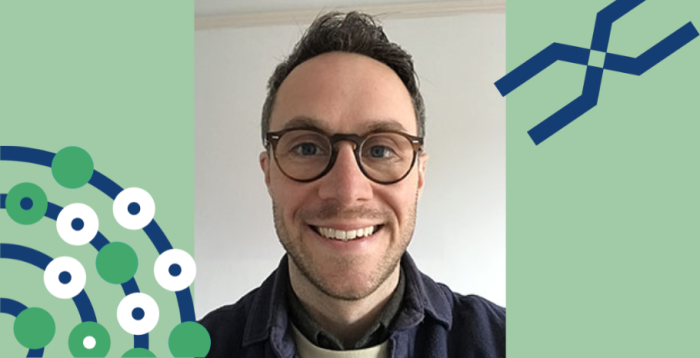Adult social care faces an increase in challenges due to the rising demand and constrained funding, making evidence-based practice even more critical. In 2021, ARC EoE was awarded funding to strengthen research capacity within social care in councils in our region. In this blog, Toby Connell, Quality Assurance Officer, reflects on his journey in research and shares the impact of this funding.

Toby Connell is a Quality Assurance Officer from Norfolk County Council and a Research in Practice Team (RiPT) Lead in the SCRiPT (Social Care Research in Practice Teams) programme. This is a two-year NIHR-funded project that aimed to build research capacity and skills in adult social care in Hertfordshire and Norfolk County Councils.
As a RiPT, I have taken on the roles of ‘leader’ and ‘learner’ simultaneously. When I started the role two-and-a-half years ago, I had no prior experience doing research, but I wanted to gain research knowledge and experience because I have always been curious about how research evidence can influence social work practice. I was excited to become a RiPT and lead a Community of Practice, where a group of professionals utilise their diverse knowledge and experiences to advance an area of common interest.
My research project is a qualitative study exploring older people’s experiences of returning home from hospital to receive further support from adult social care. Achieving quick hospital discharges has become a national policy priority due to pressure on NHS resources, the demands of an expanding elderly population, and evidence that remaining in hospital unnecessarily causes health decline to accelerate. This has led to a new approach called “Discharge to Assess,” which allows social care assessments to take place after being discharged from hospitals, often in people’s homes. We felt that this is an important topic to research, so we could understand how older people experience social care in this context.
Developing our research protocol and gaining ethical approval
Our first major task was completing our research protocol. As explained by the Health Research Authority (HRA), it is a full description of the research study and acts as a 'manual’ for members of the research team to ensure everyone adheres to the methods outlined. While I gained a stronger appreciation of the importance of careful planning in research, I also learnt that often, obstacles cannot be anticipated.
We struggled to recruit participants, which impacted the project as we were forced to make several amendments to our protocol, such as adding a recruitment site, recruiting informal carers, and completing observations of social care practice. For each amendment, approval was needed from the sponsor (University of Hertfordshire), the HRA, and one of the local authorities we were recruiting through. This delayed our ability to engage with participants and disrupted our momentum to initiate the project. While this was frustrating at times, as we did not know what action to complete next, it has put me in a better position to complete future research.
"Attending ethical approval panels for the HRA and local authority was also a valuable experience, building my confidence in articulating decisions about how to ensure the safety and wellbeing of participants."
Toby Connell, RiPT Lead
Devising a recruitment strategy
Previous studies have shown that older people can be reluctant to take part in research. This may be due to problems with how promotional materials are communicated, which can impact engagement, or they may have misconceptions about research, leading to distrust and unwillingness to participate. In our case, we chose to send promotional materials to older people by post before phoning them to give further advice and information. However, we were aware that the context of hospital discharge means that many older people may still feel unwell or want to prioritise contacts with other professionals or services.
As a Community of Practice, we decided to enlist the help of three local authority post-hospital teams to identify people who had returned home for further support. This meant relying on team managers to obtain lists of eligible people and Living Well Officers to post information on our behalf. Overseeing this as an ‘external’ researcher was challenging. The sporadic nature of our response rate meant having to go back to the teams intermittently, asking for new lists and reminding managers of the inclusion criteria. Thankfully, they were all supportive, although understandably very busy.
Eventually, we managed to complete interviews with 10 people, including two carers. Given the length of time it took to recruit and the flexibility afforded to us by the SCRiPT project leads, I am reluctant to label our strategy as a success. Although I am proud of the persistence we showed and thankful for the patience and encouragement shown by our Community of Practice.
Understanding the challenges older people face with the Discharge to Assess pathway
Hearing from older people about returning from the hospital has been fascinating. They have expressed that they felt disrupted or intruded upon, causing them to question, "Where are these people coming from?" They also spoke about the difficulties they faced in coping with the loss of their physical abilities and confidence. Another theme expressed is that “they had to sort of find things out for themselves," which highlights the difficulties older people and their family members can face when navigating complex NHS and social care processes. To address this, our final paper will explore how professionals might work with people to offer more person-centred support. The dissemination of our findings is now underway, and we hope to attend reflective practice meetings with social care professionals to initiate reflective discussions about how they can best respond to the experiences our participants shared. I hope that our project will have a continued impact the more people view our outcome materials (including an upcoming video animation) and discuss our findings. I also hope that it can be used as a reference point within co-production forums, involving local authorities and local organisations or user groups concerned with older people’s services.
How research has shaped me and my career
One of the most rewarding aspects of my experience has been speaking about the project at NIHR and SCRiPT events, including the ARC EoE Fellows Showcase in Cambridge and the SCRiPT conference in London. While I felt nervous beforehand, I gained a huge sense of achievement and confidence. From this, I learnt about the importance of self-presentation and networking to emphasise to people why I am interested in the topic and explain its value to health and social care.
Although my experience of leading from a position of inexperience has caused me some anxiety at times, I am now confident that I can lead while learning from others. This is the main benefit of a Community of Practice. At the same time, the lack of predictability in research, and the (occasionally) bureaucratic nature of research processes, can make it hard to know how best to involve other Community of Practice members equally. For social care professionals, the challenge is arguably more acute as HRA processes, and Integrated Research Application Systems are likely to be unfamiliar, and there is a lack of dedicated Research and Development support within local authorities.
"I hope that the SCRiPT Project might lead to more people with knowledge of these systems and processes being embedded in local authorities, to help support early career researchers on their learning journey."
Toby Connell, RiPT Lead
While my own future research aims are unclear at this stage, being a RiPT has given me an appetite to continue developing my research skills as a means of enhancing the impact of social work and social care practice in people’s lives. I aim to integrate my research skills into my practice by collaborating with colleagues to share knowledge and expertise. This collaboration will facilitate the exploration of evidence that informs their daily practices, ultimately encouraging them to apply this knowledge to enhance the experiences of those they support.
I am currently on secondment at the University of East Anglia as a Lecturer in Social Work, working with apprentice social workers based in my local authority. Personally, the SCRiPT project has had a big impact on me. It has given me a unique sense of what research involves, the opportunities it provides for collaborating with others, and how it can contribute towards positive changes in people’s lives.
